It was overcast, the dark sky heavy with precipitation. Charles drove well, but as with Cameroon drivers, he drove aggressively, always pushing, and passing at the limits of visibility. He had to be very alert, this is the most dangerous road in Cameroon, there are more accidents on this stretch of highway than any other, mostly because it is the most heavily traveled. At one point we were run off the road onto the shoulder by a semi passing on a blind curve. This is not infrequent and Charles took it in stride, as he did the potholes and the sections where the road has been damaged by run-off, and other hazards.
After an hour we came to Edéa, where a beautiful and impressive waterfall is visible from a highway bridge. I remember a little riverfront restaurant where my African mentor loved to stop and have a beer, but we didn’t have time.
Beyond Edéa we drove another hour, passing all the usual sights along the side of the road: makeshift shops selling palm oil, fruits, vegetables, and bushmeat which can be anything from giant snails to crabs to small forest antelopes, to monkeys to crocodiles. Men puttered along on motorcycles overloaded with pineapples, or baskets of other wares. We had to weave back and forth to avoid potholes, and to avoid oncoming vehicles themselves weaving to avoid potholes.
Well into the trip, the rain finally began, it ranged from light to heavy but now it was constant. Charles had a good windshield wiper on his side, mine was old, merely rearranging the water. It sometimes makes me carsick to look for long periods through an out of focus windscreen, but today it did not.
An hour out of Edea we reached the turnoff to the right, the road that would take us to Eseka. This road needs serious work; the potholes are numerous and deep, the washed-out areas also. It is slow going. But it is also beautiful. We are in tropical forest now, with tall trees and thick stands of African bamboo. I enjoy looking into the dark forbidding mass of foliage. One needs a machete to leave footpaths in these places.
Finally we arrived in Eseka. We drove first to the hotel conference center that was the site of the Feast of Tabernacles in 2016. It was typical of rural hotels, perhaps a bit better than most. I had thought I might take my room here, but there was no one home. We shouted out and received no reply. So we drove to my usual hotel, the Eseka Palace, a name far removed from reality. As we walked it, the woman behind the counter was lying on a pagne (a multi-purpose piece of cloth) on the floor. I asked her how it was going, if she was well. She replied, "a little", a usual response when things aren’t going too well. She did not stand, but propped herself up on one elbow.
I asked if they had rooms. She said yes. With air-conditioning? Yes. Could we see them? From the floor, she motioned us to go up the stairs. I chose room 216, the room where the air-con does not blow directly on the bed. I closed the windows to lower the risk of having many mosquitoes in the room during the night. The water was not working; there was one full bucket of water in the bathroom, which smelled faintly of sewage. The usual.
I filled in the paperwork for the room and we drove to Melanie’s house a few minutes away. There were the usual people plus a few new ones. Jules and Simon-Pierre had come from Nkoteng and several had come from Douala. The room was dark, as usual, lit only by the open window and doorway. It was light enough to read.
Lunch was ready, so we asked a blessing and ate: chicken, yam, macabo (in English, elephant ear, originally from the Amazon basin), plantain, cassava (lots of starch), spinach. It was still warm, most of it and good, although Cameroonian is not my favorite cuisine. We ate in silence; people want to concentrate on the meal which is never to be taken for granted. This would be our one meal of the day.
At the end, I was invited to cut the special pistachio cake, a traditional cake, I was told hard to cook just right. If the women manage to get it cooked through, the men applaud and reward them with a small sum of money. I cut through the banana leaves that enveloped it, and it was cooked well. With a flourish, I presented a bank note to Melanie, the men applauded and the women came in to receive their thanks. I expected the “cake” to be sweet, but it was quite spicy, with chunks of meat cooked it. In spite of the surprise it was good.
While the women cleaned up after the meal, I showed one of our French editions of In Accord on my laptop. We translate about one a month, which of course most cannot see here (little of no Internet access).
After lunch we began a Q&A Bible Study, this was the main event that everyone anticipated. There were many questions about all sorts of subjects. Sometimes the questions originated with the one asking them; sometimes people asked question to clear up a discussion they had had with someone else. These questions start with “I know the answer to this, but I’m asking for someone else….”
- Are stars angels? (This is apparently being taught by another church association).
- My answer: Angels are sometimes referred to as stars in the Bible, but the stars we see in the sky are not normally angels, they are suns, similar, in varying degrees, to our own.
- How is life the blood (Genesis 9:4; Leviticus 17:11), and since we are not to eat blood does this mean we cannot have transfusions?
- My answer: Leviticus 17:14 says that it is the blood that sustains life. Without blood, most creatures die. We are not to eat blood, but that does not apply to transfusions. When we receive a transfusion we do not eat the blood. “Eating” means something going through the mouth and digestive tract. Transfusions can save lives and that is a good thing.
- A soul is a living being but what about 1 Kings 17:21-22 where it says “his soul returned into his body”?
- My answer: the Hebrew word for soul is nephesh, which usually means a living being. But it can also be translated breath or life. So the life and breath returned to this boy’s body.
- Please explain Genesis 6:2 “The sons of God saw the daughters of men… and they took wives, etc.” Were these angels marrying women who then gave birth to “mighty men of renown”?
- My answer: Angels do no procreate (Matthew 22:30). To procreate there must be sperm; which angels cannot create. Angels do not create: God is the Creator. This is talking about marriages contracted in violation of God’s will, on wrong bases of some sort. Verse 4 says there were giants on the earth both before and after these particular marriages, so the giants were not issue only of them. Somehow these marriages contributed to the wickedness of men mentioned in verse 5. This in man living in opposition to God’s will.
- When was Jesus born and on what day of the week did He die?
- My answer: Jesus was born in the autumn, we don’t know on what day. His ministry started at age 30 close to his birthday (Luke 3:23), the age when Levites began their service (Numbers 4:3) and His ministry was 3 ½ years long. He died on Passover, so counting backward; He was born in the autumn.
- Jesus was three days and three nights in the tomb. He was buried right before sunset (John 19:31), so He had to be resurrected at the same time of day. Early Sunday morning He was already resurrected, when the women came to the tomb, so He was resurrected Saturday late afternoon just before sunset. Counting backward three days and three night, He died on a Wednesday and was buried just before sunset that day.
- Why did Noah curse Canaan for Ham’s sin and what exactly was Ham’s sin in Gen 9:20-26?
- My answer: Some believe there was a sexual violation involved in Ham’s sin, but this is not required in the context. His brothers refused to look on their father’s nakedness, which means literally that. So Ham probably simply looked and disdained his father, which to God is a serious sin. The verb form used in 9:25 indicates not a curse, but a prophecy: Canaan will be cursed. Noah saw something of the evil that was in Ham in his son Canaan, and Noah recognized that this would bring a curse on his descendants, which is in fact was happened.
- N.B. Africans often wonder if this supposed curse of Noah has fallen on the black race, resulting in a history of slavery and subjugation. There is no biblical reason to believe this. Africans came from Ham, but not all his children were black; the Canaanites were not as attested by Egyptian wall paintings.
- What should a Christian do if his/her parents do not agree with a proposed marriage? Must one obey parents in that case?
- My answer: There are several principles to keep in mind. The Commandment states that we are to honor our parents, so we should do our best to marry in a way that will not cause them pain. We are to obey God rather than men (Acts 5:29), so if parents have improper desires for a marriage, God’s will must come first. If we have reached majority and are marrying in the faith, and have counselled with the ministry, we may make our decision, understanding that familial opposition can cause significant problems especially in certain societies. As adults we must honor our parents, but as adults we are not required to obey specific instructions, nor should parents expect that of their adult children.
- Does God really forgive you over and over again for the same sin? Doesn’t that make you suspect in His eyes?
- My answer: 1 John 1:9 states that if we confess our sin to God, that is to repent sincerely, then He forgives every time. The key is sincere repentance. If we ever cease to truly repent then we will not be forgiven.
- What happens if someone who wants to be baptized dies before he can be?
- My answer: The will of God will be done. God can keep anyone alive as long as necessary for the accomplishment of His plan, including baptism. There will be a need for leaders in the period of the judgment of the Great White Throne, so perhaps God reserves some people living today for that time
- Should we maintain contact with people in other churches, COG associations?
- My answer: If the relationships are not detrimental, there is no reason to break them. We can be friendly and brotherly to people in other associations; open doors and friendships may be important in the future. But if others are aggressively proselytizing, or trying to convince us of heretical beliefs, then it’s best to let the relationship go (2 John 10).
We stopped as the sun was setting and said goodbye for the evening. I left some cash for the expenses of those who had traveled from afar, and we drove back to the Palace. There was still no water and the electrical current is so weak that as I write, the air conditioner is only blowing a feeble breath of cool air, not enough to really cool the room or, probably, keep the mozzies (as the Aussies say) at bay. I asked at the desk, the woman was still on the floor, if there was a cold beer in the refrigerator. There was. Sipping a cold beer at the end of a hot and, sweaty day is one of life’s best African pleasures.

 Eséka, Centre, Cameroon
Eséka, Centre, Cameroon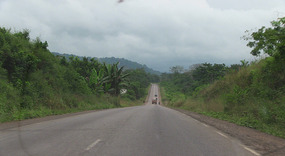
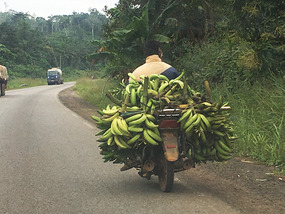
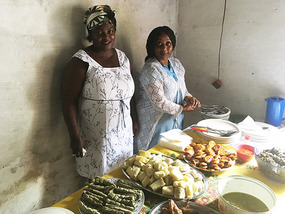
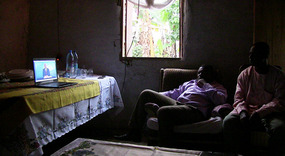
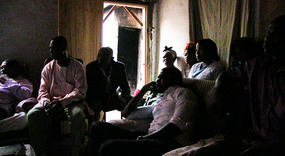






Margaret Villaescusa
2017-01-25
Hello Mr Meeker,
I am enjoying reading about your travels. Your blog's are always very interesting. I especially enjoy the Q&A sessions. Praying for your safety and for a successful trip.
mary hendren
2017-01-25
What an interesting list of questions and answers. It must have been gratifying for everyone to ask their questions and have lively discussion. Good for us to think about the Q&A, too.
Lynn Marshall
2017-01-25
I so much enjoy the questions and answers. Praying for ur safety.
Karen C.
2017-01-28
Ha! I can imagine having such excellent Biblical discussion and the driving and the heat that a cold beer was probably very refreshing. Thank you for your service, and for taking care of our brethren. Wherever you are, please give them warm greetings from Alabama. As always, we pray for your safety and encouragement.